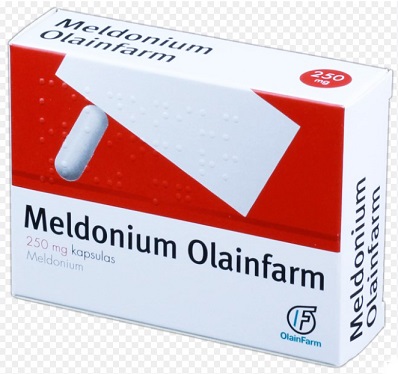Nikhil Prasad Fact checked by:Thailand Medical News Team Jun 10, 2024 1 year, 6 months, 3 weeks, 5 days, 21 hours, 11 minutes ago
Med News: Meldonium, a synthetic drug developed in the 1970s by Latvian scientists, has a fascinating history marked by its transition from agricultural uses to potential medical marvel. Initially designed to boost livestock growth, meldonium quickly found favor in human medicine due to its heart-protective properties. However, its journey from a heart medication to a controversial sports enhancer has sparked significant debate and is covered in this
Med News report based on a study review by researchers from the University of Missouri Kansas City-USA
 Meldonium: Miracle Drug or Controversial Booster?
Meldonium's Medical Journey
Meldonium: Miracle Drug or Controversial Booster?
Meldonium's Medical Journey
Approved for human use in the 1980s, meldonium gained popularity for its ability to protect the heart and improve blood flow. Its benefits soon appeared to extend beyond cardiology, hinting at possible applications in neurology, psychiatry, and even sports medicine.
How Does Meldonium Work?
Meldonium operates by inhibiting the production of carnitine, a compound essential for fatty acid metabolism. This forces cells to rely on glucose for energy, which is less damaging in low-oxygen conditions such as during heart attacks or intense exercise. This mechanism not only protects cells but also enhances their survival under stress.
Neuroprotection: Shielding the Brain
Recent studies suggest that meldonium can protect the brain from damage caused by insufficient blood flow, such as during a stroke. Research also indicates potential benefits for treating neurodegenerative diseases like Alzheimer's and Huntington's disease by improving mitochondrial function and reducing oxidative stress.
Mental Health Benefits: A New Frontier
There is growing interest in meldonium’s potential to improve mental health. Preliminary research suggests it might help with anxiety and depression by modulating brain metabolism and stress responses. One study found significant improvements in cognitive function and reductions in anxiety and depression among older patients with arterial hypertension. Another study reported that meldonium reduced depressive episodes in younger stroke patients, suggesting its potential for treating post-stroke depression.
Performance Enhancement: The Debate Continues
Meldonium's journey into the world of sports has been controversial. In 2016, the World Anti-Doping Agency (WADA) banned the drug after it was found to be widely used by athletes. The ban was influenced by concerns over fair play and the potential health risks associated with its use without proper medical justification. Proponents argue that meldonium can legally and ethically improve recovery and endurance, while opponents contend that it violates the principles of fair competition and poses unknown long-term health risks.
Clinical Applications: Beyond the Heart
-Cerebral and Neurological Benefits
Meldonium's potential extends to various neurological disorders. It has shown promise in improving outcomes for patients with chronic cerebrovascular diseases and acute ischemic stroke by enhancing blood flow and protecting nerve cells. Additionally, meldonium's ability to relieve neuropathic pain in animal models suggests potential applications for treating pain-related neurological conditions.
-Enhancing Cognitive Function
Research indicates that meldonium may enhance cognitive function, particularly in improving memory and attention. This has implications for treating conditions like ADHD and cognitive impairments associated with aging. Some studies have even suggested that meldonium can improve visual memory and cognitive flexibility in athletes, furthering its potential as a cognitive enhancer.
-Psychiatric Benefits
The potential psychiatric benefits of meldonium are particularly intriguing. Its effects on neurotransmitter systems and its ability to reduce oxidative stress may offer new treatment avenues for anxiety and depression. For instance, meldonium therapy has been associated with significant improvements in anxiety and depressive symptoms in various patient populations. Its stress-relieving properties, observed in animal studies, further support its potential as a psychotropic agent.
Safety and Side Effects: What You Need to Know
Meldonium is generally well-tolerated, but it can cause side effects such as headaches, rapid heartbeat, and low blood pressure. Long-term safety data is limited, especially for healthy individuals using it for performance enhancement. Some rare adverse reactions include allergic responses, dyspeptic symptoms, and fluctuations in blood pressure. There are also concerns about potential interactions with other medications and the risk of misuse, particularly in sports contexts.
Ethical and Regulatory Challenges
The regulatory status of meldonium varies globally. It is approved in Russia and several Eastern European countries but remains unapproved in major Western nations due to concerns about its performance-enhancing effects and limited clinical evaluation. The ban by WADA and the subsequent debates highlight the ethical and regulatory challenges in balancing therapeutic benefits with fair competition in sports.
Conclusion: A Drug with Dual Faces
Meldonium stands at the crossroads of medical innovation and sports ethics. Its potential therapeutic benefits for heart and brain health are undeniable, yet its use in sports continues to spark controversy. As research progresses, the future of meldonium will hinge on rigorous scientific studies and ethical considerations to determine its rightful place in medicine and athletics.
The study review was published in the peer reviewed journal: Psychoactives.
https://www.mdpi.com/2813-1851/3/2/15
Important, never attempt to take any medications or supplements of any kind without consulting a medical doctor. Always check with a doctor who has your health records and history before taking medications or supplements of any kind.
For the latest
Med News, keep on logging to Thailand Medical News.
Read Also:
https://www.thailandmedical.news/news/study-finds-that-doctors-are-actually-killing-sepsis-patients-by-using-the-antibiotics-piperacillin-and-tazobactam
https://www.thailandmedical.news/news/long-term,-daily-low-dose-aspirin-intake-does-not-prevent-incidence-of-stroke,-instead-increases-risk-of-intracerebral-bleeding-in-older-adults-by-38-
